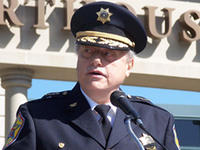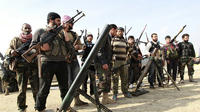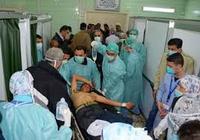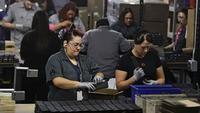-
Draft cybersecurity bill to increase penalties for hacking substantially
A draft of a cybersecurity bill circulating among House Judiciary Committee members would strengthen a computer hacking law. The draft would stiffen penalties for cyber crimes and establish a standard for companies to tell consumers when their personal information has been hacked. The bill would also change an existing law, making a cyber crime attempt punishable as an actual offense.
-
-
ICE agents tell senators to go slow on in immigration reform
Chris Crane, the head of the union representing Immigration and Customs Enforcement (ICE) agents, has asked the bipartisan group of senators, known as the Gang of 8, which is working on immigration reform to allow ICE agents to offer their input.
-
-
Automakers help Detroit emergency services
General Motors, Ford Motors, and the Chrysler Group joined Blue Cross Blue Shield of Michigan, Quicken Loans, and several other businesses in the Detroit area to donate $8 million for new ambulances and police cars, on the same day that emergency manager Kevyn Orr started his job.
-
-
Pennsylvania Sheriff charged for making terrorist threats

A Pennsylvania sheriff was arrested and charged Monday for threatening to chop off a Democratic campaign worker’s hands, shoot a reporter, and intimidate witnesses.
-
-
U.S. military instructors training Syrian rebels in camps in Jordan

U.S. military sources said that American Special Operations forces and Special Force troops agents have been training small groups of Syrian opposition forces in Jordan. The training, conducted jointly by U.S. and Jordanian military instructors, has been going on for more than eight months now.
-
-
How U.K. can better prepare for emergencies
Well designed and planned exercises are essential to ensure that the United Kingdom can respond effectively to emergencies of all kinds. The emergencies may take the form of a terrorist attack, flooding, pandemic flu, rail or air disaster — or any major disruptive event requiring an emergency response.
-
-
DHS helps tear down technological “Tower of Babel” along U.S. borders
First responders and international officials on both sides of the U.S.-Canadian border had been preparing since last fall for the Canada-U.S. Enhance Resiliency Experiment (CAUSE) — demonstrating the ability to exchange information between local, state, provincial, and national systems and software applications. With these preparations, a recent joint experiment held in Maine and New Brunswick proved that even across borders, any immediate confusion or lack of information following an incident should not greatly affect overall rescue efforts.
-
-
Rebels, not the Syrian army, fired last week’s chemical weapon: experts

Western intelligence services, analyzing the few facts known about the use of a chemical weapon near Aleppo in north Syria last week, have concluded that it was one of the rebel militias, rather than Assad government forces, which fired a “home-made” chlorine-based chemical artillery round. If the conclusion of the intelligence services is correct, it raises disturbing questions about both the capabilities of at least some rebel militias – and about their readiness to use non-conventional weapons.
-
-
Budget cuts force the FAA to shut down 149 control towers
The FFA will have to cut $637 million before 30 September. It plans to do so by give 47,000 employees two week furloughs, shutting down 149 control towers, and cutting overnight shifts at seventy-two different traffic facilities. Some worry about the impact these measures will have on air travel safety.
-
-
Enhancing Army capabilities as new threats emerge
Some twenty-eight nations have some type of weapons of mass destruction capability, with some of them having nuclear weapons or nuclear-weapons capability. The nuclear materials in many of these countries are kept in hundreds of sites without global safeguards in place for securing them. A senior American military official described these loose nukes as the “single biggest existential threat to Western survival.” Yet, in a recent exercise, the U.S. response time for deploying 90,000 troops to a crisis area – an area which included loose nukes, other WMDs, or both — took fifty-five days. U.S. military leaders say this is just not good enough.
-
-
Israel and Turkey end acrimony, normalize relations
In a major coup for the Obama administration’s Middle East policy, Turkey and Israel have today (Friday) announced that they were putting an end to the increasing acrimony which has characterized their relationship since 2006, acrimony which has intensified even further in May 2010, when Israeli commandos killed nine Turkish citizens who were on a flotilla which tried to break the Israeli maritime blockade of the Gaza Strip. The normalization of relations between the two staunchest U.S. allies in the region would make it easier to establish a U.S.-Israel-Sunni Arab coalition to contain Iran and thwart its hegemonic designs in the region, and will tighten the coordination among Syria’s neighbors as the civil war in Syria enters its final phase, and as preparations for post-Assad Syria are undertaken in earnest.
-
-
Comprehensive bipartisan immigration reform bill to be unveiled early April
The Gang of 8, a bipartisan group of senators, is finalizing work on a comprehensive immigration reform bill which will be introduced shortly after Congress comes back 8 April. The bill will offer a path to citizenship to illegal immigrants, add up to 200,000 visas per year depending on the U.S. economic conditions and employment needs, increase substantially the number of visas allocated for highly skilled tech workers, and reduce some categories of family visas.
-
-
In 2012, Microsoft received 70,665 law-enforcement requests for customer information
On Thursday, Microsoft released the number of law enforcement requests it has received for information on its hundreds of millions of customers. By releasing the information, Microsoft is now putting itself on the same team as Google, Twitter, Yahoo, and other Web businesses which have published reports on law-enforcement request for customer information. In 2012 Microsoft received a total of 70,665 law-enforcement requests for customer information.
-
-
Justice Department agrees 1986 snooping law should be reviewed
The U.S. Justice Department said earlier this week that it supports reviewing legislation which allows U.S. law enforcement officials to read someone’s e-mails without a search warrant. The 1986 Electronic Communications Privacy Act (ECPA) states that federal authorities only need a subpoena issued by a federal prosecutor, not a judge, to search through a person’s e-mails which are older than 180 days or which have already been opened.
-
-
Gun manufacturer to leave Colorado after governor signs gun bill

Colorado governor John Hickenlooper on Wednesday signed a state gun control bill which will expand background checks and limit ammunition magazine capacity. The measure is notable because Colorado has been considered a firearm-friendly state.
-
More headlines
The long view
Factories First: Winning the Drone War Before It Starts
Wars are won by factories before they are won on the battlefield,Martin C. Feldmann writes, noting that the United States lacks the manufacturing depth for the coming drone age. Rectifying this situation “will take far more than procurement tweaks,” Feldmann writes. “It demands a national-level, wartime-scale industrial mobilization.”
No Nation Is an Island: The Dangers of Modern U.S. Isolationism
The resurgence of isolationist sentiment in American politics is understandable but misguided. While the desire to refocus on domestic renewal is justified, retreating from the world will not bring the security, prosperity, or sovereignty that its proponents promise. On the contrary, it invites instability, diminishes U.S. influence, and erodes the democratic order the U.S. helped forge.
Fragmented by Design: USAID’s Dismantling and the Future of American Foreign Aid
The Trump administration launched an aggressive restructuring of U.S. foreign aid, effectively dismantling the United States Agency for International Development (USAID). The humanitarian and geopolitical fallout of the demise of USAID includes shuttered clinics, destroyed food aid, and China’s growing influence in the global south. This new era of American soft power will determine how, and whether, the U.S. continues to lead in global development.
Water Wars: A Historic Agreement Between Mexico and US Is Ramping Up Border Tension
As climate change drives rising temperatures and changes in rainfall, Mexico and the US are in the middle of a conflict over water, putting an additional strain on their relationship. Partly due to constant droughts, Mexico has struggled to maintain its water deliveries for much of the last 25 years, deliveries to which it is obligated by a 1944 water-sharing agreement between the two countries.
How Disastrous Was the Trump-Putin Meeting?
In Alaska, Trump got played by Putin. Therefore, Steven Pifer writes, the European leaders and Zelensky have to “diplomatically offer suggestions to walk Trump back from a position that he does not appear to understand would be bad for Ukraine, bad for Europe, and bad for American interests. And they have to do so without setting off an explosion that could disrupt U.S.-Ukrainian and U.S.-European relations—all to the delight of Putin and the Kremlin.”
How Male Grievance Fuels Radicalization and Extremist Violence
Social extremism is evolving in reach and form. While traditional racial supremacy ideologies remain, contemporary movements are now often fueled by something more personal and emotionally resonant: male grievance.
